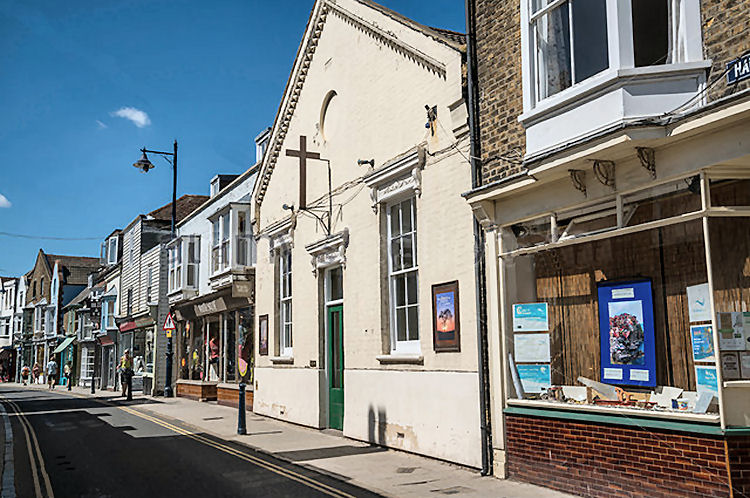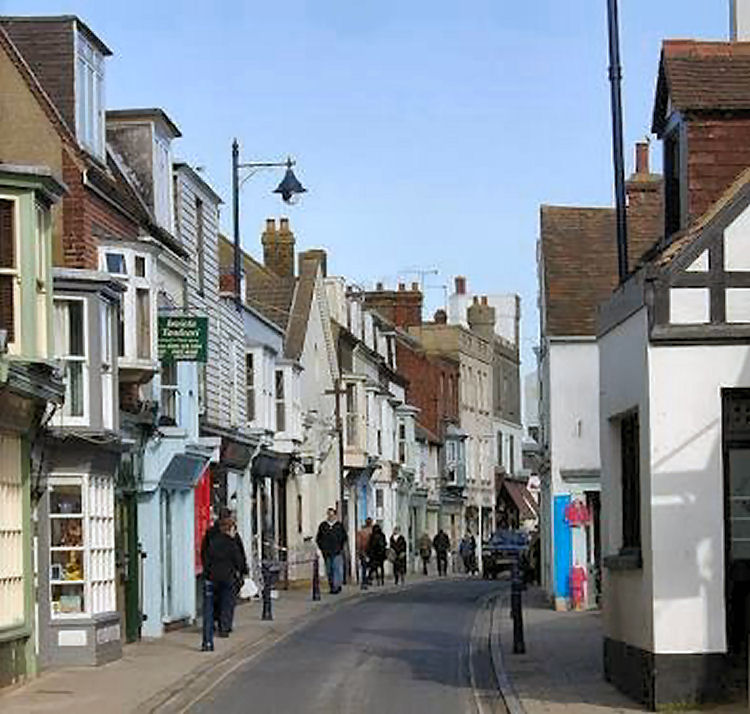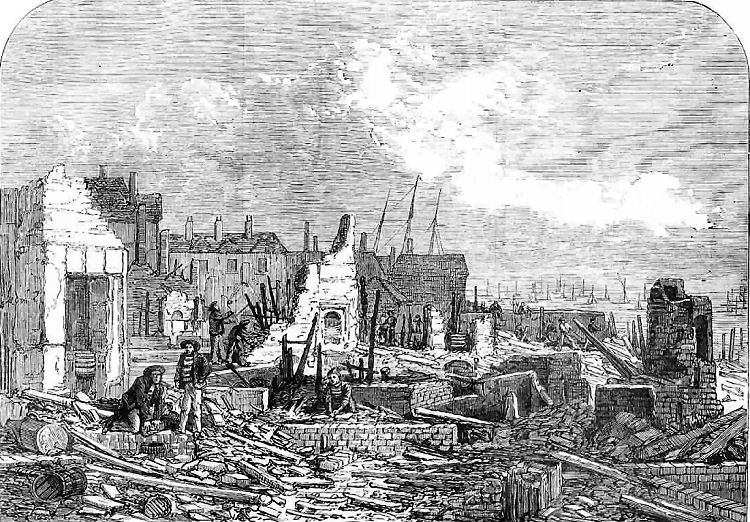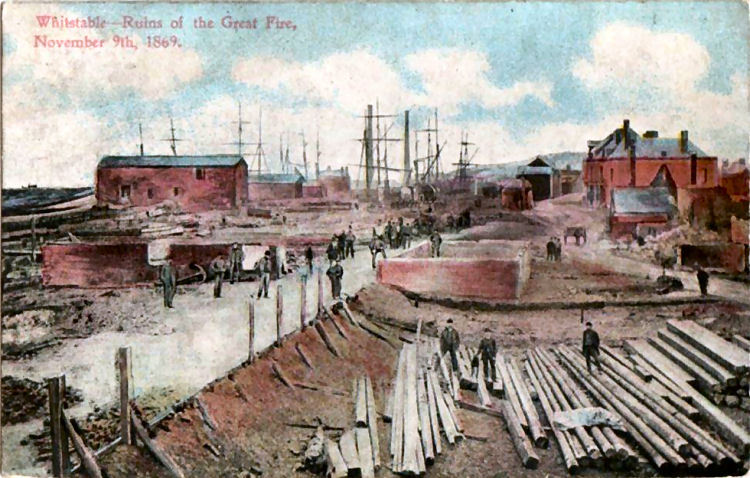|
10 Harbour Street
Whitstable

Above photo, date unknown. |

Above photo 2017, kindly by Garth Wyver, who says the following:- The
former "Nelson Inn" on extreme right of photo the "Spread Eagle Inn" was
the building or on the site of what became a church, in the middle of
this photo. It's the building with the gabled roof. Next to the second
man on the left. |
|
|
|
Canterbury Journal, Kentish Times and Farmers' Gazette, Saturday 8 September 1866.
St Augustine's Petty Sessions. Saturday. Annual Licensing Day.
The county Magistrates renewed the publicans' spirit licence today.
Applications were also heard for new licences, and, as well be seen by
the following list, the majority of these were granted.
Applications refused, John Wheeler, "Spread Eagle," Whitstable.
|
|
From the Whitstable Times and Herne Bay Herald. 14 September 1867. Price 1d.
ANNUAL LICENSING DAY WHITSTABLE
The annual licensing Sessions for the Home Division of the County of
Kent were held at Canterbury on Saturday last. A license for the “Spread Eagle” was applied for by John Wheeler, but
refused on the ground that the house was badly conducted. |
|
Whitstable Times and Herne Bay Herald. 9 December 1871.
Felony.
Ellen Miller, a married woman, and Eliza Straus, a character well known
to the police, were charged with having stolen a boys cloth coat, of the
value of 10s., the property of Mr. Thomas Wootton, of the "Spread Eagle
Inn," High Street.
It appeared that the prisoner Straus was drinking in a room in the
house, and that after she left, the coat, which had been placed on one
of the chairs in the room, was missed.
P.C. Petley called at Miller's house, in which Straus Lodged, and, on
searching it, found the coat hidden in the coal cellar.
Miller thereupon admitted having received it from Straus after she left
the "Spread Eagle," and having carried it home.
The prisoners both pleaded guilty, Miller asking the Bench to deal
leniently with her, as she was the mother of five children, and her
husband was at work away from home.
Mrs. Wootton, the wife of the prosecutor, also recommended Miller to
mercy.
The Bench, after some consideration, sentenced each of the prisoners to
three weeks hard labour.
|
I am informed that the address was number 10. The premises appears to
have been taken over by a church, or perhaps a church was built on the site
of the old pub although when and why that happened I am still to find out.
I am informed that the premises burned down in the 'Great Fire' of 1869
and a Plymouth Brethren chapel was built on the site. Although there does
appear to be a name mentioned in the licensee list below in 1871, but he could well have been the
owner of the area in question.
|
From the Whitstable Times and Herne Bay Herald - Saturday 13 November 1869.
DREADFUL CONFLAGRATION. IMMENSE DESTRUCTION OF PROPERTY.
One of the most alarming and destructive fires that has ever taken
place in this town occurred on Wednesday night last. It commenced in or
near the premises - a large wooden building - the property of Mr.
Charles Hoult, mast and block maker, which were very speedily consumed,
and the flames spreading rapidly communicated with the blocks of
buildings on either side, continuing their work of destruction on the
right as far as the Harbour gates, and on the left till they approached
the premises of Mr. Josiah Reeves, another mast and block maker, which
only escaped demolition by the timely pulling down of two storehouses
adjoining. Had not the progress of the fire been by this means stayed,
the consequences would perhaps have been the destruction of half of the
town.
The total number of buildings that were consumed is said to be no less
than 71, of which 25 were inhabited houses of larger and smaller
dimensions, the remainder consisting of storehouses, workshops, and
business premises. The principal of these buildings are the premises
belonging to Mr. Hoult, as before stated, those occupied by Messrs.
Daniels Brothers, sail makers, and Mr. J. Graves, sail maker, the
Auction Mart belonging to Mr. J. T. Reeves, a large building belonging
to Mr. J. Camburn, which is used as an office by the Whitstable Maratime
Assurance Association, the "Victoria" public house (in the occupation of
Mr. Marsh) and cottages adjoining, some ten houses pointing to Harbour
Street, including the house and premises occupied by Mr. Woolley, baker,
and the beer house in the occupation of Mr. Wheeler.
(Spread Eagle) All these and
others were totally destroyed, and the scene of ruins which was
afterwards presented was indeed sad to behold.
The spectacle which the conflagration produced during the time it was
raging is beyond description. An eye witness - an old inhabitant of the
town - speaks of it apart from the serious consequences which attended
it, as truly magnificent as beheld from the Rock, and he states that the
flames, extending as before described, so lighted up the sky that
objects at a great distance might be seen almost as at midday. Seldom
has this demon of destruction executed its direful work with such
rapidity as on last Wednesday evening, which may be imagined from the
fact that the fire did not break out till half-past ten, and that by
half-past two the ruin was complete. Still this may be understood when
the character of the majority of the buildings - composed as they were
chiefly of timber and thickly tarred from top to bottom, with roofs
covered with asphalte - is taken into consideration, and also the fact
that the fire was urged on in its fury by the force of the wind, which
was blowing strong from the North at the time. It is only surprising
that the destruction was not even greater, and it is certainly fortunate
that the shipping in the harbour, of which there was a considerable
quantity, escaped.
The alarm had no sooner been given than the town Fire Brigade were on
the spot with their engine, and in about a couple of hours four other
engines arrived - the Kent and Norwich from Faversham, and the Kent and
Phoenix from Canterbury - but they were unable to render assistance for
some time for want of water, the only supply being from the sea, and the
tide happened to be low at the time. When at length water could be
procured all the engines went vigorously to work and did excellent
service in checking the progress of the fire and ultimately putting it
out.
As may naturally be supposed the excitement occasioned in the town was
intense. Many were fearful that the wind might come round, as is often
the case, from the East, and if this had happened other portions of the
town would have been exposed to a similar fate as that which is now a
mass of charred and blackened debris; consequently a large number of the
inhabitants, though residing at distances from the immediate vicinity of
the fire, took the precaution to remove their furniture and goods to
places of greater safety, for which purpose carts, barrows, and all
kinds of conveyances were brought into requisition, and loads of
furniture were to be seen going about in all directions.
We regret to say that only in a few instances were the household goods
of the occupiers of the demolished buildings rescued, but by far the
greater portion of them lost all they possessed, having time only to
escape with their lives. As the poor creatures turned out of their homes
a most distressing scene was presented, many having barely sufficient
clothing to cover them, and yet the night was as cold and bleak as the
depth of winter. By some means they got shelter; those who were able to
afford it doing so most cheerfully. Several persons lying dangerously
ill had to be removed on stretchers and other means, and we regret to
have to add that one of them, a young woman, the daughter of Mr. J.
Waters, died before she reached the house of a friend, to which she was
being taken. Another of the sufferers was a young woman who had only
been confined a few hours before the occurrence of the fire. She was
taken out of her residence in a state of unconsciousness, produced by
fright, and in that state she remained for a considerable time
afterwards. A young man, the son of Mr. Beckett, who had for a long time
been stretched upon a bed of sickness, was removed upon a stretcher to
the house of Mr. Robert Pettman, sen., in the High-street, and it was
reported on Thursday that he, too, had expired, but on enquiry we
learned that this was not the case, although the sufferer was in a very
low condition.
To estimate the value of the property destroyed with any degree of
correctness at present would be impossible, but we are informed upon
good authority that it cannot fall short of £10,000. Most of the house
property was insured, either in the Kent or Norwich offices, and we
understand that by far the greater portion of the loss will fall upon
the latter. As may be supposed the household goods of only a small
proportion of the occupiers of the houses were insured, so that the
consequences to them will be serious in the extreme. We sincerely trust
that their case may be taken up by some influential gentlemen of the
town, and that something may be done to alleviate their distress.
The origin of the fire is involved in mystery. Of course various reports
are in circulation, but which is true it is impossible to decide. We
must not omit to state that Mr. Walker, the active Superintendent of the
Kent Constabulary of the Home Division, with a good staff of men,
arrived on the spot soon after the outbreak and rendered efficient
service in protecting the property of the inhabitants which was exposed
to depredation.
In concluding our report of this sad disaster, we can but notice a very
injudicious act on the part of the gas directors in giving instructions
for the gas to be turned off at the works, the effect of which was to
add to the consternation which prevailed by putting the town in utter
darkness; and persons who were desirous of securing their property,
instead of having "light in their dwellings," were obliged to do the
best they could by groping about in the dark. What the motive for this
proceeding could have been is a mystery, and should, we think, be
explained.
|
|
From the Whitstable Times and Herne Bay Herald - Saturday 20 November 1869.
THE SUFFERERS BY THE LATE FIRE.
As we anticipated, little time has been lost in forming an organisation
in behalf of the sufferers by the late fire, who in number are upwards
of seventy, and whose distress is all that destitution can create. On
Monday evening last a public meeting of the inhabitants was held in the
Music Hall (which was kindly lent for the occasion by Mr. T. G.
Browning), for the purpose, as the notice stated, of considering what
steps should be taken to help the sufferers by the fire. The attendance
was large, and comprised most of the leading townspeople and
representatives of all religious denominations.
The Rev. H. W. Bateman, having been voted to the chair, opened the
proceedings by referring to the recent calamitous fire, which had, he
said, brought destitution and distress upon many families. He then
proceeded to read a list of the most pressing cases calling for public
help, as follows:
In Harbour-street: Carden, (beachman), wife and two children; lost
everything but a few clothes, a bed, and two or three chairs.
Widow Carden and daughter; lost everything.
Robertson (seaman), wife and three children; saved only a few clothes
and a chair or two.
Carlton (seaman), wife and infant; lost all but a few clothes.
Geo. Bryson (baker) and four children, and Geo. Bryson, wife and four
children; both families lost nearly everything.
On the Wall: Widow Walker; lost all, barely escaping with her life.
Walker (seaman), wife and three children; lost all but a few clothes and
a bed.
Fogg (shoemaker), wife and four children; lost nearly everything.
Smith (seaman), wife and two children; lost everything.
Hall (seaman), wife and one child; lost nearly everything.
Rigden (labourer), wife and eight children; saved but little.
Foreman (journeyman sail maker), wife and two children; saved about
two-thirds; thrown out of work.
Marsh (journeyman mast maker) and wife.
Bishop (seaman) and wife, lodging at "Victoria Inn," belonging to Dover;
lost everything.
Jenner (shoemaker); lost stock of tools, value £3.
Continuing his remarks, the rev. gentleman said he was pleased to see so
large a meeting, and he was particularly glad to see upon the platform
the Rev. W. J. Andrew, the minister of the congregational denomination
in this town. He further mentioned that he had called upon the Rev. Mr.
Vint, and the Rev. Mr. Danzy Sheen, the Wesleyan and Primitive Methodist
ministers, for the purpose of inviting them also to attend, and they
would gladly have done so but for the previous engagements which
necessitated their absence from town that evening. He felt quite sure
that the pressing necessities of the numerous cases would excite the
immediate sympathy of the meeting, and that steps would be devised for
securing the assistance which was so much needed.
|

Scene of the Destructive Fire at Whitstable. |

Above postcard showing the Ruins of the Great Fire, 9th November 1869. |
If anything is incorrect on these pages, please let me know. Your help is appreciated.
LICENSEE LIST
WHEELER John 1866-67 refused
WOOTTON Thomas 1871+
|



